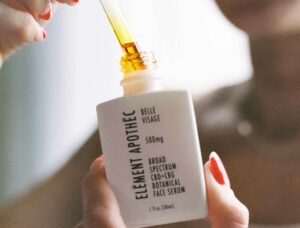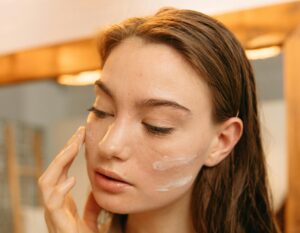Disclosure: I receive a small commission for purchases made via affiliate links.
Ever felt like your skin is dry, irritated, broken, and just not looking its best? If so, you’re not alone, we have all been there. Chances are, you might have damaged your skin barrier and now you want to know how to repair a damaged skin barrier.
Your skin barrier can act up for many reasons, it could be stress, harsh products, over-exfoliation, or even a bad run-in with the weather. The biggest takeaway is that when your skin barrier is compromised, it becomes dry, irritated, inflamed, prone to acne, and reactive to products it once tolerated.
Sometimes, there’s also an itchy feeling. Your skin is basically in SOS mode and even your go-to skincare products might sting or make things worse.
What is a skin barrier?
Skin barrier which is also known as the stratum corneum, is the outermost layer of our skin that serves as a protective barrier. It prevents moisture loss and protects against external environmental irritants including bacteria and pollutants.
This barrier is made up of skin cells (corneocytes). Those are held together by lipids, like ceramides, fatty acids, and cholesterol. A healthy barrier keeps skin hydrated and balanced. In short, skin barrier is your first line of defense against irritants.
What happens when your skin barrier is broken?
When your skin barrier is broken, it’s basically refusing to hold onto moisture, letting irritants come right in, and just making your life miserable. That’s why you suddenly get dryness, flakiness, itchiness, breakouts, and, in some cases, full-blown eczema flare-ups.
Appearance related signs of damaged skin barrier
Dry, scaly, and flaky skin
Dull complexion
Uneven skin tone, hyperpigmentation
Rough and scaly patches
Visible cracks
Sensation-related signs
Itchiness
Tightness or a stinging sensation
Increased sensitivity
Other signs
Acne and breakouts
Redness and inflammation
Increased sensitivity to UV radiation
Delayed wound healing
What causes a broken skin barrier?
Harsh skincare products
Oftentimes, we use products that are too harsh for our skin, especially those containing alcohol or astringent bases, which strip our skin of its natural oils. We can also damage our barrier if we overuse potent ingredients like salicylic acid, retinol, or benzoyl peroxide.
Over-exfoliation
Excessive exfoliation can damage the skin’s lipid barrier. It’s often advised that people with dry or sensitive skin should not exfoliate more than twice a week. Also I would advised not to use salicylic acid with retinol in the same skincare routine. Both these ingredients are potent and work at cellular level, it will only worsen your skin condition if used in the same routine.
Use of physical exfoliators
Nowadays, there are many tools available on the market for physical exfoliation. If you wish to use one, make sure it’s dermatologist-approved, but first I would suggest putting a hold on its use until your skin barrier is fully healed.
Hot water
Using hot water too often can also damage your skin barrier. It’s tempting to take hot showers in winter, but try to keep them short or use lukewarm water instead. It might seem like a minor detail, but make sure to pat dry with a soft fabric towel instead of rubbing after cleansing your face or taking a shower.
Poor nutrition
It’s not just about treating your skin from the outside but also from within. Your skin needs essential nutrients like healthy fats (omega-3s and ceramides), vitamins (A, C, D, E), and proteins to maintain its structure and function. A lack of these can lead to dryness, dehydration, redness, and reduced collagen production, all of which make your skin more fragile.
Lack of sleep and stress
Not getting enough sleep and taking too much stress can also lead to a compromised skin barrier. Both increase your cortisol levels which in turn weakens the skin barrier. You might have noticed that when you are stressed, you are more likely to get acne, often called stress-induced acne.
That’s because a weakened skin barrier, combined with increased oil production due to increased cortisol, makes your skin more prone to breakouts and irritation.
What to do when skin barrier is damaged
Now that you have officially confirmed your skin barrier is down bad, it’s high time to hit pause on your usual skincare routine and focus on giving your skin all the lost goodies such as ceramides, hyaluronic acid, fatty acids, basically everything that was keeping your outer layer happy and intact.
Basic skincare routine for a damaged skin barrier
My personal skincare routine for a damaged skin barrier focuses on keeping things simple. I start with a gentle and non-stripping cleanser, same one for my morning and evening. Then, I follow up with a basic hydrating toner to give some water back and calm my irritation.
A barrier-repairing moisturizer comes next to lock in hydration and restore lost lipids. During the day, I always finish with SPF to protect my skin from UV damage. During this time, I avoid exfoliation, actives, and harsh ingredients until my skin is fully healed. My personal favorites are:
Cleansers
CeraVe Hydrating Facial Cleanser:
CeraVe hydrating facial cleanser is my go-to cleanser whenever my skin needs a little extra TLC. It has a minimal ingredient list, is sulfate-free, fragrance-free, and even accepted by the National Eczema Association, so you know it’s gentle enough for eczema-prone and sensitive skin. Plus, it’s packed with ceramides, hyaluronic acid, and glycerin, exactly what you want in a cleanser when your skin barrier is compromised.
Dot & Key Barrier Repair + Hydrating Face Wash
Dot & Key Barrier Repair facewash has recently become my second favorite. It contains five essential ceramides, hyaluronic acid, probiotics, and Japanese rice water. It’s fragrance-free and non-drying, making it a great choice for sensitive skin. The probiotics help balance the skin microbiome, which is often disrupted when the barrier is compromised.
Hydrating Toners
Byoma’s Hydrating Toner
Byoma Hydrating Milky Toner and moisturizer have saved my skin barrier more times than I can count. The toner is packed with barrier lipids, everything your skin craves when the barrier is compromised. After cleansing, I go in with a layer of this, and it gives my skin that much-needed hydration right away.
Moisturizers
For Overnight Repair I swear by La Roche Posay Cicaplast Balm b5, your skin will thank you in the morning. I can’t even begin to tell you how many times cicaplast balm b5 balm has saved my freaked-out skin barrier. Honestly, I have decided I am going to keep buying it for the rest of my life, it’s that good.
For Eczema-Prone Skin: If your skin leans more toward a dermatological condition like eczema, it’s best to consult a dermatologist to get a proper diagnosis. But if you do have eczema, Vanicream Moisturizing Skin Cream is one of the best out there. It’s even earned the Eczema Foundation’s Seal of Approval meaning its gentle enough to be used on sensitive skin.
Spf
CeraVe Hydrating 100% Mineral Sunscreen Body SPF 50 contains essential ceramides, niacinamide and hyaluronic acid. Its a mineral sunscreen containing zinc oxide and titanium dioxide and provides broad spectrum UV protection without irritating the skin. Mineral sunscreens are much gentler on compromised skin barrier. It doesn’t contain any fragrance.
This post contains affiliate links. If you click through and support Modysch financially (at no extra cost to you), thank you so much! For more details, see the full Disclosure.
Maleeka is an orthodontic resident with a passion for skincare and beauty. She decodes beauty products, breaks down ingredients, and spills the tea on marketing hypes. When she’s not perfecting smiles or geeking out over the latest formulations and trends, you’ll find her binge-watching Netflix.





Pingback: I Had A Damaged Skin Barrier & Here’s How The Ordinary Moisturizer Helped
Pingback: Is $14.99 Byoma Hydrating Milky Toner Really A Dupe For Rhode Glazing Milk?
Pingback: La Roche Posay Cicaplast Balm B5 To The Rescue For My Freaked-Out Skin Barrier
Pingback: Best Korean Skincare Routine For Acne Prone Skin